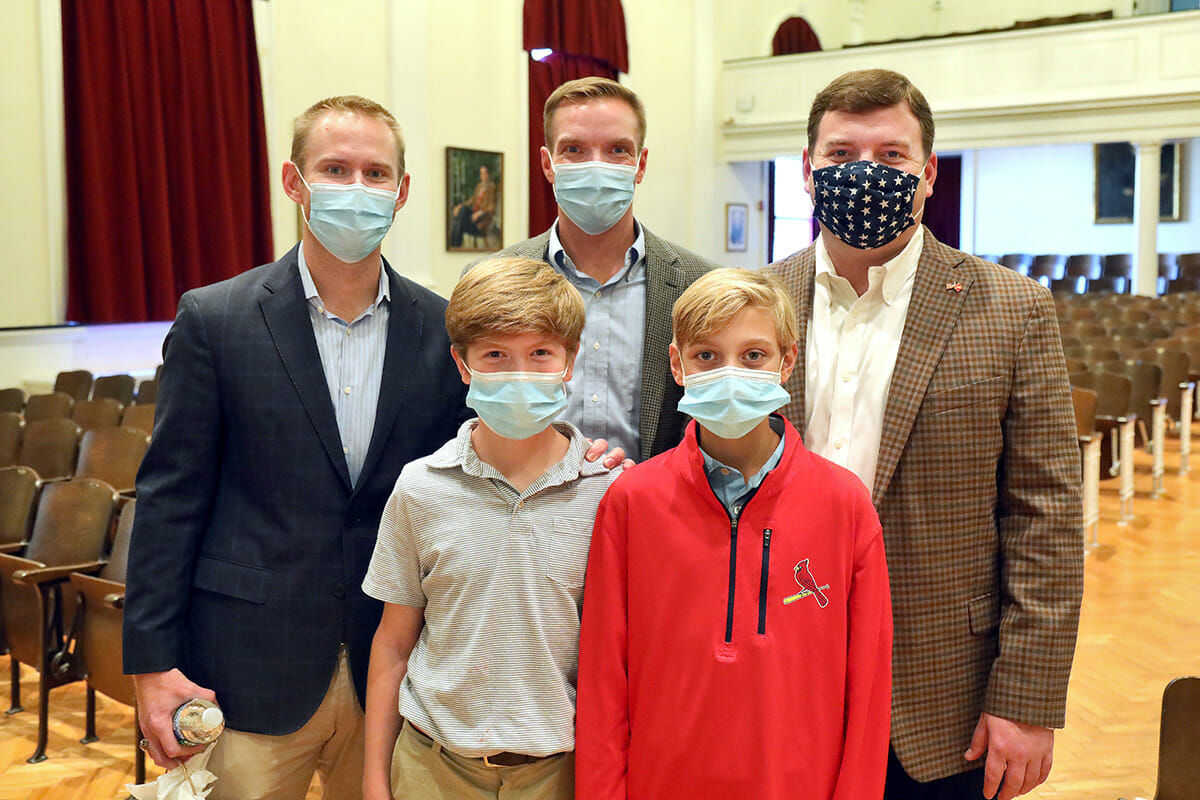The adjective “inveterate” gets a bad rap, I think. Its most common uses have negative connotations: inveterate enemy, inveterate gambler, inveterate hatred, inveterate liar. At root, though, the word simply means “of long standing.” (“Inveteratus” in Latin translates as “made old.”) Repetition and habit seem implicit in the definition, and I am reminded of the etymologically related word “veteran” and the habits that it, too, implies–habits of discipline, dedication, gratitude, and sacrifice. Three veterans of our MICDS community and of United States military service alike, in whom such selfless habits are clearly manifest, spoke to a group of our students in Eliot Chapel on Thursday.
Thanks to the vision and organizational efforts of JP Senneff ’28 and Drew Mills ’28, our fifth- and sixth-grade classes were able to hear the recollections of Ryan Harbison ’03, Ryan Maher ’04, and Charles Mullenger ’06 about their experiences at MICDS and their subsequent years of service in the armed forces. Particularly powerful were the connections that these men drew between the two. Habits of perseverance, understanding, diligence, and teamwork all featured in their remarks, as did an appreciation for community—an appreciation for the privilege of being part of something greater than oneself.
I expect that almost every citizen of our nation is familiar with Emanuel Leutze’s 1851 painting Washington Crossing the Delaware. Our future first president stands tall before an American flag, his right knee braced for balance, amid a boat full of Revolutionary War soldiers navigating river ice floes in unison and leading several other boats engaged in the same project in the early morning hours of December 25, 1776. Fast forward to November 1, 2021, and we find the New Yorker cover artist Barry Blitt depicting a far more discordant scene. Some soldiers insist on rowing to one shore, others to the other. Cartoon fists are raised in protest, faces are contorted with anger, oars are smashed against heads. Even Washington himself is assailed, on his left by a soldier tearing at his cape and on his right by another one sinking teeth into the general’s boot. Blitt calls this piece of contemporary social and political commentary Crossing the Divide. Divide, yes. Crossing, no–or not enough.
Recalling the words of Mr. Harbison, Mr. Maher, and Mr. Mullenger gives me heart. As members of the MICDS community, first as students and now as alumni, they understand themselves to be part of something greater than themselves. As veterans of the United States Armed Forces, they understand this again on a much larger scale. As American citizens, they understand it more fully still. We would all benefit from the wisdom of their perspective. We would all benefit from practicing their inveterate habits of discipline and dedication, humility and gratitude, selflessness and sacrifice–instilled at MICDS and sustained in their lives beyond. To Mr. Harbison, Mr. Maher, and Mr. Mullenger; to all other alumni who now serve or who have served in our nation’s military; to all service members and veterans among our faculty and staff, our current parents, and all other constituencies of our MICDS community: we are thankful for you this week of Veterans Day. We are, like Mr. Senneff and Mr. Mills in the sixth grade, your inveterate fans.
Always reason, always compassion, always courage. I wish you all a restful and joyful weekend ahead.
Jay Rainey
Head of School
This week’s addition to the “Refrains for Rams” playlist: Dried Up River by The Lone Bellow. “I’m so tired of the scream and shout. / We’re all drinkin’ from that dried-up river.” (Apple Music / Spotify)
